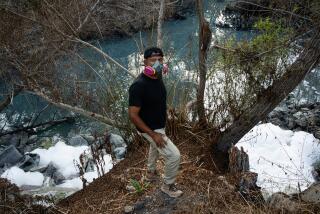Residents aim to sweeten the aroma of Tacoma : For years, it seemed the city was resigned to reeking. But an ambitious civic effort has targeted the odors.
TACOMA, Wash. â In legend and in fact, Tacoma stinks.
Drive up Interstate 5 on your way to Seattle, roll down the window, sniff the breeze for yourself:
Thatâs the flatulent bouquet of 100 years of industrial development. Or, as the wags say, the smell of money.
But along with hydrogen sulfide, the vapors of animal rendering and assorted industrial fumes, there is change in the air for Tacoma, long Seattleâs ugly and overlooked industrial stepsister, the Northwestâs Rodney Dangerfield.
Pushed by a crusading newspaper, citizen activists and civic fear of losing out on the booming economic growth of greater Puget Sound, Tacoma is out to make itself smell better.
Enter the malodor monitors, the stench squad.
âThe trouble has been, odor is a subjective matter,â said Colleen Malone, a community activist. How do you measure stink? How do you write laws that say, donât stink up the town? Every real city is a miasma of diesel fumes, landfill mists, sewer plant gases and other noxious odors. At what point does a city deserve a reputation for bad breath?
This autumn, local officials plan on selecting a dozen or so ordinary citizens for a volunteer monitoring program. They will undertake what local officials believe is one of the most ambitious efforts ever by a community to calculate just exactly how bad it smells and why.
The volunteers will be trained how to recognize odors and calculate their intensity. They will chart weather patterns and wind directions. Perhaps their work will lead to new air pollution ordinances, but at the least, they will be living proof that Tacoma is not resigned to reek.
âIf we are going to do anything about this, weâre going to have to bring it into the open: We have an odor problem,â said Joe Sorcio, who represents the county executive officer on the local and regional air quality commissions.
And how bad is it?
A blue-collar town of 176,664 people on Puget Sound 37 miles south of Seattle, Tacoma earned its rank reputation during decades of industrial growth. Here, where a shipping port converges with a railroad, sprouted a tidal basin full of pulp mills, rendering plants, chemical factories, petroleum processors and aluminum smelters. Their combined vapors went aloft into a tiny air basin plagued by thermal inversions. Odors were trapped and concentrated.
The Aroma of Tacoma. Itâs been known that way for at least 50 years.
Today, some of the old factories have closed. Others, like the giant Simpson Paper Co. mill have spent millions on renovations.
âIâve lived here 20 years, and itâs improved dramatically,â said City Manager Ray Corpuz. But still, there are nights when the wind is calm and the remaining smell is so sharp it awakens residents in their sleep. Frequent freeway drivers in the region know to roll up their windows at the first Tacoma exit sign. The smell hangs unmistakably in the background of restaurants, theaters and office buildings.
âOppressive,â declared the Tacoma Morning News-Tribune, a feisty daily paper that has editorialized against the slow-moving progress of local government and industry. â . . . Tacomaâs future should not forever be held hostage to rancid, rotten-egg air.â
Over the years, the paper has followed the progress of other industrial cities. In a recent front-page series called âCleaning the Air,â a News-Tribune reporter described how Jacksonville, Fla., made huge strides in suppressing factory smells.
The trouble is that some industrial vapors such as those from pulp mill processes, can be detected by humans in unbelievably tiny concentrations, down to just a few parts per billion.
âThere, you smell that,â Malone said. She is driving along the waterfront. âThat egg smell, like somebody is making potato salad. Thatâs a chemical plant.â
She drives on. There are miles of waterfront where old wharves and warehouses have been torn out and replaced by a grassy Tacoma City Park that would be the pride of any city, full of joggers and bicyclists and families pushing baby strollers.
âThat smell,â she said, coming across a new and dank odor, âthatâs nature. Thatâs the tideflats.â
At the head of the bay, the park yields to steam stacks and industrial plants shoulder to shoulder. âThatâs the mill,â Malone said, identifying the sharp, characteristically offensive sulfides that are associated with paper pulping.
Some Tacoma residents, particularly newer residents, are agitating to shut down industries that will not filter out offensive smells. Others, among them the business Establishment, counsel patience while the big industrial plants of the city are incrementally modernized.
Either way, Malone says, Tacoma is going to change. âPeople are waking. And they want to smell the coffee.â
More to Read
Sign up for Essential California
The most important California stories and recommendations in your inbox every morning.
You may occasionally receive promotional content from the Los Angeles Times.










